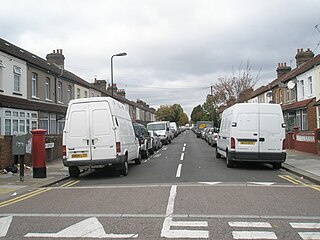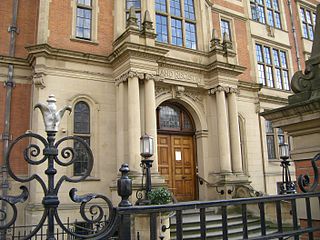A mortgage is a legal instrument of the common law which is used to create a security interest in real property held by a lender as a security for a debt, usually a mortgage loan. Hypothec is the corresponding term in civil law jurisdictions, albeit with a wider sense, as it also covers non-possessory lien.
In finance, a security interest is a legal right granted by a debtor to a creditor over the debtor's property which enables the creditor to have recourse to the property if the debtor defaults in making payment or otherwise performing the secured obligations. One of the most common examples of a security interest is a mortgage: a person borrows money from the bank to buy a house, and they grant a mortgage over the house so that if they default in repaying the loan, the bank can sell the house and apply the proceeds to the outstanding loan.

The Land Registration Act 2002 is an Act of the Parliament of the United Kingdom which repealed and replaced previous legislation governing land registration, in particular the Land Registration Act 1925, which governed an earlier, though similar, system. The Act, together with the Land Registration Rules, regulates the role and practice of HM Land Registry.

The Law of Property Act 1925 is a statute of the United Kingdom Parliament. It forms part of an interrelated programme of legislation introduced by Lord Chancellor Lord Birkenhead between 1922 and 1925. The programme was intended to modernise the English law of real property. The Act deals principally with the transfer of freehold or leasehold land by deed.

In law, an equitable interest is an "interest held by virtue of an equitable title or claimed on equitable grounds, such as the interest held by a trust beneficiary". The equitable interest is a right in equity that may be protected by an equitable remedy. This concept exists only in systems influenced by the common law tradition, such as New Zealand, England, Canada, Australia, and the United States.
For the oil and gas terminology of overriding royalty interest, pleasesee Overriding Royalty Interest.
Birmingham Midshires Mortgage Services Limited v Sabherwal [2000] 80 P&CR 256 is an English property law case, concerning the principles of equitable interests, overriding interests, and overreaching interests. It is one of many cases where the commercial rights mortgage lenders need to do business clash with the rights of innocent parties facing the loss of their home.
English property law is the law of acquisition, sharing and protection of valuable assets in England and Wales. While part of the United Kingdom, many elements of Scots property law are different. In England, property law encompasses four main topics:

A freehold, in common law jurisdictions such as England and Wales, Australia, Canada, Ireland, and twenty states in the United States, is the common mode of ownership of real property, or land, and all immovable structures attached to such land.

Lloyds Bank plc v Rosset[1990] UKHL 14 is an English land law, trusts law and matrimonial law case. It specifically deals with the translation into money of physical contributions from a cohabitee or spouse, under which its principles have been largely superseded.
Overreaching is a concept in English land law and the Law of Property Act 1925. It refers to a situation where a person's equitable property right is dissolved, detached from a piece of property, and reattached to money that is given by a third party for the property. This happens, according to City of London Building Society v Flegg in any case where property is bought or mortgaged in a contract with two or more title holders.

Williams & Glyn's Bank v Boland [1980] is a House of Lords judgment in English land and trusts law on an occupier's potentially overriding interests in a home.

Unregistered land in English law is land that has not been registered with HM Land Registry. Under the residual principles of English land law, for unregistered land proof of title is based upon historical title deeds and a registry for certain charges under the Land Charges Act 1972.

English land law is the law of real property in England and Wales. Because of its heavy historical and social significance, land is usually seen as the most important part of English property law. Ownership of land has its roots in the feudal system established by William the Conqueror after 1066, but is now mostly registered and sold on the real estate market. The modern law's sources derive from the old courts of common law and equity, and legislation such as the Law of Property Act 1925, the Settled Land Act 1925, the Land Charges Act 1972, the Trusts of Land and Appointment of Trustees Act 1996 and the Land Registration Act 2002. At its core, English land law involves the acquisition, content and priority of rights and obligations among people with interests in land. Having a property right in land, as opposed to a contractual or some other personal right, matters because it creates priority over other people's claims, particularly if the land is sold on, the possessor goes insolvent, or when claiming various remedies, like specific performance, in court.

The Land Registration Act 1925 was an act of Parliament in the United Kingdom that codified, prioritised and extended the system of land registration in England and Wales. It has largely been repealed, and updated in the Land Registration Act 2002.

Chhokar v Chhokar [1984] FLR 313 is an English land law case concerning constructive trusts law and widening the natural meaning of "actual occupation". The facts of the case showed an intention to do a woman out of her occupational interest in a matrimonial home, as the new co-owner buying his share from the husband knew of her situation from the outset and wished to resell the property. The court confirmed in these exact circumstances her interest was overriding at the time when she was in hospital and it was a constructive trust.

National Provincial Bank Ltd v Ainsworth [1965] is an English land law and family law case, concerning the quality of a person's interest in a home when people live together, as well as licenses in land.

Registered land in English law accounts for around 88 per cent of the total land mass. Since 1925, English land law has required that proprietary interests in land be registered, except in cases where it is necessary to protect social or family interests that cannot reasonably be expected to be registered. English law also runs a parallel system for around 12 per cent of land that remains unregistered.

Akers v Samba Financial Group[2017] UKSC 6, [2017] AC 424 is a judicial decision of the Supreme Court of the United Kingdom relating to the conflict of laws, trust law and insolvency law.

Pilcher v Rawlins (1872) 7 Ch App 259 is a decision of the English Court of Appeal in relation to the rights of the beneficiaries under a trust against a bona fide third party purchaser for value of the trust property.












